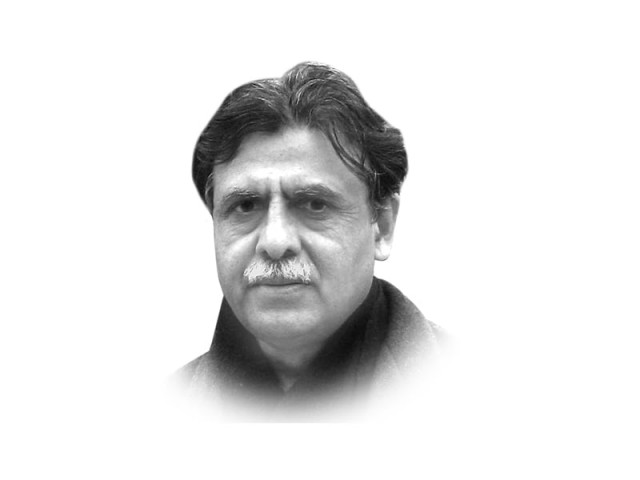Politics of entrenchment
While PML-N workers went door-to-door facilitating voters in LG polls, PTI workers were conspicuously absent

The writer is an author, a public policy analyst and former interior secretary. He teaches at LUMS
There are some inferences to be drawn from these results. The regional complexion of the two mainstream political parties is very evident. In Sindh, the PPP reinforced its rural power base while in Punjab, the urban-based PML-N has been successful in extending its reach to peri-urban and rural areas. In the 1980s, there was a distinct shift in the power base in Punjab when the military government under General Ziaul Haq nurtured and promoted an urban industrial political culture which relied less on the traditional rural power base. With the locus of power further deepening through state policies, the stage was set for a politics of entrenchment. This unfolded through a policy of patronage and preferential treatment for a chosen few who worked as ears and eyes of their benefactors.
Empires in the distant past relied upon an elite dependent model for their survival and governance. With the onset of nation-states, this model was supplanted by a bureaucratic model that provided legitimacy and longevity to the rulers through different policy choices. Today, developed societies continue to rely on the merit-based bureaucratic Weberian model, where fealty, conformism and malleability have little room compared to merit and evidence-based advice. What we see in Pakistan, however, is the amalgam of the two, where the ruling class not only leverages local power wielders, it also reinforces them by providing bureaucratic trappings. The local elite, in return, formalise its power base, which is drawn from different sources, like their business and commercial standing, landed base and, above all, familial ties. This ends in mini-fiefdoms being propped up by ground-level bureaucratic levers. The story does not end here as one sees a violation of Weberian principles of merit and seniority, and denial of objective advice, with groups of civil servants prepared to break the queue and become sources for even deeper political entrenchment for the ruling class. This comes from having a knack and willingness to produce desired results, notwithstanding the opportunity cost and trade-offs.
Looking at this scenario through the prism of history, large-scale recruitments in Punjab in the mid-1980s were carried out after rules were relaxed in some key departments, such as the police, excise taxation and local government departments. This indicates that a breed in the bureaucracy, as part of the entrenchment process, has been in place at critical positions for 30 years now. Punjab has now come of age with all recruitments, even at the lower scales, being made through the provincial public service commission. In Sindh, the PPP government, on the other hand, has been using employment as a tool to further entrench its political base. During its last tenure, thousands of recruitments were made in the education sector and other key departments, with complete disregard for rules, to curry favour at the local level.
The importance of local government institutions cannot be over-emphasised. Any problem can best be solved where it rears its head. The question, however, is to what extent are federal and provincial governments prepared to give space to these institutions. Cantonment boards headed by serving military officers, development authorities, water and sewerage boards and now even waste collection authorities have restricted the mayoral domain. There is an innate tendency in provincial leaderships to appropriate municipal roles in order to gain higher visibility and more political mileage.
In neighbouring India, through an amendment to its Constitution, a distinct set of functions has been earmarked for rural and urban local bodies, respectively. Likewise, taxable and non-tax sources of these institutions have also been identified leaving little scope for state governments to fiddle with their administrative and financial autonomy. There is a need to provide constitutional protection to the core functions of local governments in our country as well.
The recent local government elections have given a wake-up call to both the ruling PML-N and the PTI, which suffered a complete rout in Lahore. What happened in Faisalabad between two sitting ministers underlined the PML-N’s complicity in not only encouraging violation of party discipline, but also violation of the spirit of the law dealing with party-based elections. The two ministers were gunning for each other’s throats openly. In a democratic dispensation, such conduct by serving ministers would have been enough to show them the door. The PTI, at the same time, needs to get out of its victimhood syndrome and strive for some intense soul-searching. A resident from Gulberg, Lahore, told me that while PML-N workers went door to door facilitating voters by providing them with details of electoral rolls, PTI workers had been conspicuously absent from the scene. PTI Chairman Imran Khan should be credited for raising the expectation level of the electorate by advocating enviable standards for leadership. It was, however, unfortunate to see him lose his cool on a question asked by a journalist in Peshawar. To the discerning mind, more than his personal life, it was his sense of judgment that was under scrutiny. He could have given a more nuanced reaction. His handling of the query disappointed his well-wishers. People in general, while acknowledging the leader’s right to privacy in the face of a highly intrusive media, feel that his avowed acts and deeds are public property. The electorate is keen to know as to how our leaders make their personal choices while being entrusted with the stewardship of the lives of the people.
Published in The Express Tribune, November 17th, 2015.
Like Opinion & Editorial on Facebook, follow @ETOpEd on Twitter to receive all updates on all our daily pieces.














COMMENTS
Comments are moderated and generally will be posted if they are on-topic and not abusive.
For more information, please see our Comments FAQ